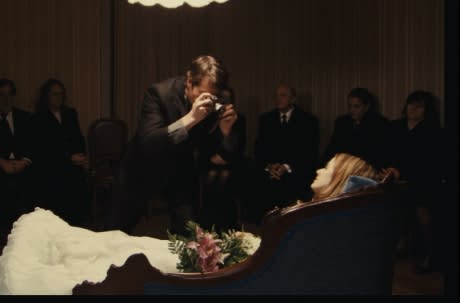Though in his 103rd year, Portuguese director Manoel de Oliveira is still churning out films without sign of slowing down, expanding on his preoccupations with the anachronistic, the building of historical myth, religious conflict and the nature of the socially contrary perspective. Having shot historical dramas, surrealist works, documentaries, literary adaptations and an abundance of religious fables, the prolific Oliveira has demonstrated an aptitude and understanding of the medium and its versatility that few living directors can appreciate.
With The Strange Case of Angelica, he reiterates his exaggerative, theatrical style with trademark stationary camerawork while detailing the socially counterintuitive instincts of young Jewish photographer, Mr. Isaac (Ricardo Trêpa), after he witnesses the seeming emergence of an Angel photographing the recently deceased, Catholic, Angelica (Pilar López de Ayala). Having seen the dead beauty come to life through the lens of his camera unbeknownst to those around him, he becomes obsessed with her very essence and symbolic meaning—something juxtaposed with the extended image of a cat staring at a bird in a cage.
Despite the seemingly incendiary contrast of Judaism and Christianity, the imagery, save the usage of a crucifix as symbol of the undiscerning nature of the bourgeoisie, treads on common ground, occupied most with Angelic presence and its relation to the Cosmos. When not photographing vineyard manual labourers—whom his landlady is quick to point out serve no purpose anymore in an era of machine efficiency—he is routinely examining his photographs and fantasizing about, or potentially experiencing, otherworldly visits from Angelica.
His socially contrary disposition of interpreting spiritual presence and outdated modes of survival inevitably makes him an outcast among the locals who, when not discussing his peculiarity, talk about the nature of the global economy and broad Scientific concepts, much to his indifference. In asserting the superficial commonalities amidst Abrahamic religions, as contrasted with Isaac's self-involvement and casual annoyance with a local begger, de Oliveira is setting up inherent hypocrisies and the inherent incongruities that create social, and personal, divides.
This overriding perspective is smartly demonstrated through the eyes of fantasy, which, as it turns out, is ultimately the only mode of escape from the imposed limits, or cage, of those unable to perform, or adhere to, the status quo. And interestingly enough, with de Oliveira's overly theatrical mise-en-scene and deliberately mechanical, sometimes abrasively melodramatic, performances, his filmmaking similarly demonstrates a gauche juxtaposition to the status quo, making his works easy to dismiss or reduce to spectacle of casual farce.
The Strange Case of Angelica screens on Saturday, November 17th at 6pm at the Royal.
(Cinema Guild)With The Strange Case of Angelica, he reiterates his exaggerative, theatrical style with trademark stationary camerawork while detailing the socially counterintuitive instincts of young Jewish photographer, Mr. Isaac (Ricardo Trêpa), after he witnesses the seeming emergence of an Angel photographing the recently deceased, Catholic, Angelica (Pilar López de Ayala). Having seen the dead beauty come to life through the lens of his camera unbeknownst to those around him, he becomes obsessed with her very essence and symbolic meaning—something juxtaposed with the extended image of a cat staring at a bird in a cage.
Despite the seemingly incendiary contrast of Judaism and Christianity, the imagery, save the usage of a crucifix as symbol of the undiscerning nature of the bourgeoisie, treads on common ground, occupied most with Angelic presence and its relation to the Cosmos. When not photographing vineyard manual labourers—whom his landlady is quick to point out serve no purpose anymore in an era of machine efficiency—he is routinely examining his photographs and fantasizing about, or potentially experiencing, otherworldly visits from Angelica.
His socially contrary disposition of interpreting spiritual presence and outdated modes of survival inevitably makes him an outcast among the locals who, when not discussing his peculiarity, talk about the nature of the global economy and broad Scientific concepts, much to his indifference. In asserting the superficial commonalities amidst Abrahamic religions, as contrasted with Isaac's self-involvement and casual annoyance with a local begger, de Oliveira is setting up inherent hypocrisies and the inherent incongruities that create social, and personal, divides.
This overriding perspective is smartly demonstrated through the eyes of fantasy, which, as it turns out, is ultimately the only mode of escape from the imposed limits, or cage, of those unable to perform, or adhere to, the status quo. And interestingly enough, with de Oliveira's overly theatrical mise-en-scene and deliberately mechanical, sometimes abrasively melodramatic, performances, his filmmaking similarly demonstrates a gauche juxtaposition to the status quo, making his works easy to dismiss or reduce to spectacle of casual farce.
The Strange Case of Angelica screens on Saturday, November 17th at 6pm at the Royal.
